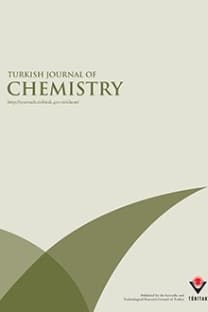Investigation of photoinduced polymerization of doxycycline-imprinted hydrogels: effect of template on initiator reactivity, conversion, and reaction rate
Photopolymerization kinetics of doxycycline hyclate (DOX)-imprinted hydrogels were monitored by real-time Fourier transform infrared spectroscopy and differential photocalorimetry. 2-Hydroxyethyl methacrylate-based hydrogels were synthesized by using ethylene glycol dimethacrylate as a cross-linker, acrylic acid (AA) as a functional monomer, and 2,2-dimethyl-2-hydroxy acetophenone as a photoinitiator. For imprinting DOX in hydrogels, the molar ratio of template to functional monomer (DOX:AA) was chosen as 1:8 and 1:16. The polymerization was achieved at two different initiator concentrations. The conversion and reaction rate were calculated as a function of the molar ratio of template, and the results were compared to those of nonimprinted ones. In order to reveal the effect of DOX on the photoinduced radical polymerization, thermal polymerization was also performed for imprinted and nonimprinted hydrogels by using 2,2$' $-azobis(2,4-dimethyl-pentanenitrile) as a thermal initiator. All results showed that there is a significant effect of DOX concentration on the conversion and reaction rate of the photopolymerization reaction. The conversion and reaction rate decreased during photopolymerization when the template concentration increased in the monomer mixture.
Keywords:
Molecular imprinting, photopolymerization, photosensitivity,
- ISSN: 1300-0527
- Yayın Aralığı: Yılda 6 Sayı
- Yayıncı: TÜBİTAK
Sayıdaki Diğer Makaleler
Ayşe Şahin YAĞLIOĞLU, Hülya ŞENÖZ
Ana PETKOVSKA, Jelena ACEVSKA, Marina CHACHOROVSKA, Gjorgji PETRUSEVSKI, Gjoshe STEFKOV, Rumenka PETKOVSKA, Aneta DIMITROVSKA, Sonja UGARKOVIC
HAYRİYE MİNE ANTEP, TAŞKIN MUMCU, KAMİL BOSTANCI, SERAP SEYHAN BOZKURT, MELEK MERDİVAN
Mustafa TÜZEN, Nebiye OZKANTAR, Mustafa SOYLAK
Ayşe ŞAHİN YAĞLIOĞLU, Hülya ŞENÖZ
Jelena ACEVSKA, Marina CHACHOROVSKA, Gjorgji PETRUSEVSKI, Gjoshe STEFKOV, Rumenka PETKOVSK, Aneta DIMITROVSKA, Sonja UGARKOVIC, Ana PETKOVSKA
Radu BANICA, Petrica LINUL, Cristina MOSOARCA
